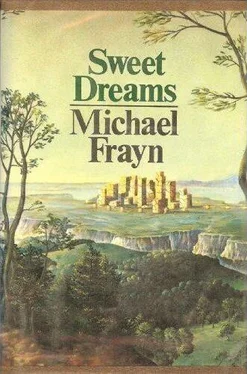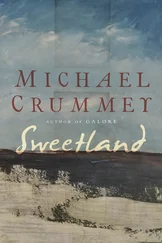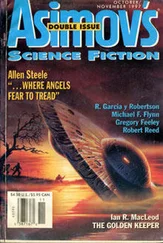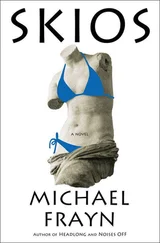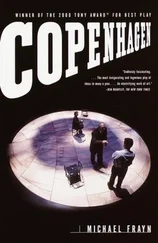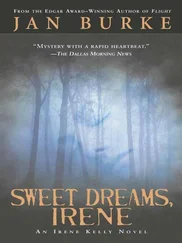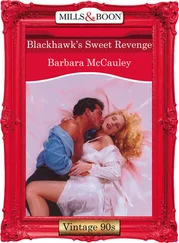Howard and Felicity sit facing each other in the evenings across the empty fireplace (they have central heating, of course, and there’s no point in getting soot in the curtains unless they have guests). He wears a dark three-piece suit, but from a sense of natural modesty he has his suits considerably better cut than Freddie’s. Felicity wears a beige twin set, but keeps her slip modestly out of sight.
“It feels better, doesn’t it?” says Howard. “If one’s honest with oneself.”
“I’ve always preferred old things and quiet colours,” says Felicity. “In myself — underneath.”
Howard draws on his pipe. (He smokes a pipe now.)
“When one’s first married,” he says, “when one’s first down from the university, one keeps striking attitudes. One’s whole style of life is intended to make claims about oneself — to announce one’s group loyalties and relationship with the world. The rest of one’s life is a process of dropping the claims, one by one. And with each claim one drops, one feels better. More relaxed. More honest. More oneself . The less one makes of oneself, the more one is oneself. The less one is who one thinks one ought to be, the more one is who one is. I feel more myself now than ever.”
“Yur,” says Felicity. “Terrifically true.”
They all live in solid old houses near the Park now — the Chases, the Bernsteins, the Waylands, Charles Aught, the Goodys — their whole set. They all have dark brown pictures on their walls, and oatmeal skirts, and umber dogs. The only thing the rest of them lack is a policeman at the gate.
“We really do seem to have taken over,” says Prue at her dinner-parties, looking at them all.
“There has been a real revolution, when you think about it,” says Michael Wayland.
“A kind of quiet revolution, from within,” says Miriam Bernstein.
“The only sort that works,” says Charles Aught.
“Oh, there’s no doubt about it,” says Bill Goody. “There’s been a radical change in the whole structure of society during the last few years.”
So radical has the change been that Freddie and Caroline are sometimes at Prue’s dinner parties now. Which is agreeable. Although in some ways it’s even more agreeable when they’re not, because then Howard does his famous imitation of Freddie — Freddie being praised, Freddie being jealous, Freddie doing his best to unbend enough to be wrathful. Howard has got him beautifully.
“Dear Howard,” murmurs Prue, pressing his hand. She never forgets that it’s Howard to whom they all owe their place in the new order of things.
The only people who seem to have failed to benefit from the revolution are Phil and Rose. They are living in some slightly embarrassing suburb — the kind of suburb that has a dog track and an immigrant problem. Phil rather faded out after his terrible fiasco with the premiere of man. Months and months of advance publicity, and newspaper articles about the seriousness and dedication of everyone involved — then the curtains parted, and out onto the stage walked a rather tubby little figure with a balding forehead and thin hair flying in the wind, who leaned anxiously forward and waved his arms about as he talked. The audience began to trickle away as he told a series of long, rambling stories to which he forgot the punch lines, conducted a hesitant affair with somebody else’s wife, and announced half-baked plans for an ideal world. The reviews next morning were disastrous. “This self-important manikin simply will not do … a unique combination of vanity, greed, and incompetence … his capacity for deceiving himself about his own motives would seem to be boundless … underdeveloped arm and shoulder muscles … a chronic inability to formulate sublime thoughts … if the production models are not a vast improvement on this pitiful prototype, God help us all….”
“Poor old Phil,” Howard says to Felicity at quite frequent intervals. “I suppose he always was too clever by half. All the same, I can’t help feeling rather sorry for him. And for Rose. I suppose she married him with her eyes open. Still …”
“We must have them to dinner some time,” says Felicity.
“Who with, though? That’s the problem.”
They think hard, but as Freddie says, you can’t just plunge in unilaterally and put everything to rights.
“Poor Phil,” says Felicity.
“Poor Rose,” says Howard.
At the office Howard surrounds himself with a team of young men and women just down from university. They are all newly married, with small babies who are allowed to stay up to dinner to talk amusingly about sex. They wear brightly coloured shirts, and their hair falls in front of their eyes as they talk.
Howard is very fond of them all. They are his creations — he has chosen them himself, and provided each one with a livelihood and a way of being. And they amuse him. He is tickled by the idea they all have of him as a fool and a hypocrite and a mass-murderer. He plays up to them, producing shocking ideas and attitudes which he lets himself half-believe. They know that he is playing a part; they are amused by his attempts to amuse them; and grow fond of him; and thereby demonstrate their own tolerance to themselves; and grow even fonder of him as the occasion of the demonstration. He enjoys their affection. And what he enjoys even more is the knowledge that their affection is based upon patronizing him from what they take to be their greater radicalism; while in fact, under the surface, he is more radical than they will ever be. He feels the piquant double pleasure of the secret millionaire who has won everyone’s heart even in apparent poverty.
The radicalism of the young people in his office consists in this: that they want to create an ideal world flowing with milk and honey, where man is brother to man, and lives in harmony with nature; where ice is warm to the touch, and no ocean is too wide for a child to wade across, bucket and spade in hand.
But he can see, from the vantage-point of his experience of life, how shallow and patronizing this conception of happiness is. His radicalism now takes this form (and Freddie is in more or less complete agreement): to help all men enjoy the same possibilities for happiness as he does himself — no less.
And what has made his own life in this society so deeply pleasurable (as he now sees, looking back on it) is the difficulty of it, the opportunity it has offered to strive and overcome. He has had to struggle with nature; compete with the most brilliant men and women of his generation; labour to outstrip his own achievements. His life here has been one long series of decisions taken with difficulty, of crises resolved. And in the process he has developed and grown. His intelligence and sensibility and compassion have been stretched.
His life has a sense of purposive onward movement. This is the heart of the matter.
So the universe he is trying to build is one which offers its inhabitants the possibility of moral action; one which challenges its inhabitants to transcend it.
He discreetly steers the old Alps plan through, and fosters ambitious projects to stud shipping routes with underwater rocks, and the atmosphere with unpredictable patterns of clear-air turbulence. He throws his weight behind the creation of a vast sub-arctic tundra, where labour camps could be built and great writers developed. He’s also intrigued by a proposal for a desert with just enough vegetation to support a group of nomadic tribes, and exactly the right mix of privation to enable these tribes to develop a monotheistic religion. Monotheism could be a very suggestive metaphor, he feels.
“Because what we’re aiming at,” he philosophizes to his young graduates, when he invites them round to dinner, in twos and threes, together with the Chases or the Waylands, and sometimes Freddie and Caroline, “is something deeper than a little physical hardship. What we have to build is a universe so manifestly and intrinsically unjust that its inhabitants cannot fail to rebel against it. Permanent revolution — this is the only interesting human condition. Only in rejecting the terms on which life is offered to him can a man discover his real dignity, his real self.”
Читать дальше
